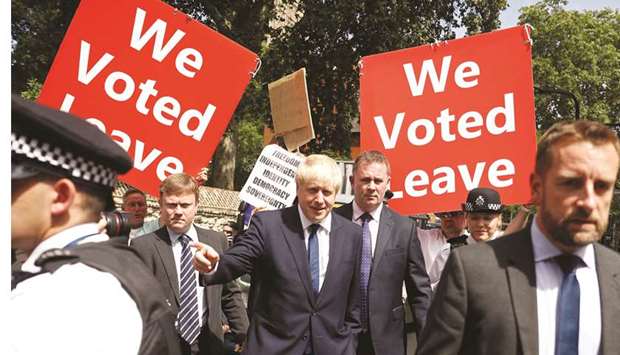Alan Duncan, minister and longstanding critic of Boris Johnson, quit yesterday, the latest resignation before the presumed new prime minister takes office with a “do or die” pledge to leave the European Union with or without a deal.
The resignation of Duncan, a junior foreign office minister, underlines the strength of feeling in the governing Conservative Party and parliament against a no-deal Brexit that many businesses say would be catastrophic for the economy.
Attempting to launch a pre-emptive strike against Johnson, Duncan also tried to force an emergency vote in parliament today to test whether the new premier could command a majority.
Parliament’s speaker turned the request down, the BBC reported.
Stalling economic growth — the National Institute of Economic and Social Research (NIESR) yesterday said there was a one-in-four chance Britain has already tipped into recession — is fuelling many lawmakers’ worries about a no-deal Brexit.
Duncan follows Margot James, who stepped down as a culture minister last week, describing as “quite incredible” Johnson’s promise to leave the EU by October 31 regardless of whether a deal is in place to smooth its departure.
On Sunday, Finance Minister Philip Hammond also said he would resign rather than be sacked by Johnson, promising to fight with others in parliament to stop a rupture in relations with the EU, the country’s biggest trading partner.
In his resignation letter to outgoing Prime Minister Theresa May, Duncan said: “The UK does so much good in the world. It is tragic that just when we could have been the dominant intellectual and political force throughout Europe, and beyond, we have had to spend every day working beneath the dark cloud of Brexit.”
He pointedly noted that he had worked with “two very different foreign secretaries” — Johnson and his rival to become prime minister, Jeremy Hunt.
Later, he applied for an emergency debate to see whether parliament had “considered the merits of the newly chosen leader of the Conservative Party and supports his wish to form a government”.
But the speaker’s refusal meant his attempt to test the new prime minister’s popularity failed.
Duncan’s decision to step down comes as little surprise. He has shown no reticence in criticising Johnson, his former boss at the foreign office, once describing him as a “circus act”. Earlier this month, he attacked Johnson for not defending Britain’s former ambassador to the US after a leak of his criticism of US President Donald Trump’s administration.
Duncan said Johnson had “basically thrown our top diplomat under the bus”. Several other ministers are expected to leave their posts if, as expected, Johnson becomes new prime minister tomorrow, fearing that a no-deal Brexit would plunge the stalling economy into a deeper slump.
Putting the chances of Britain leaving the EU without a deal at roughly 40%, NIESR yesterday said that risks to growth were now “heavily weighted to the downside”.

Boris Johnson, a leadership candidate for the Conservative Party, leaves his office in London yesterday.
